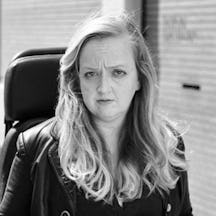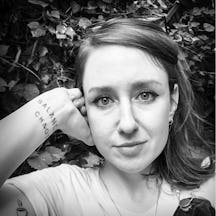In early March 2020 Athena Stevens thought she’d caught a cold. Two lockdowns later and still suffering from ‘long Covid’, she reflects on how a thousand small choices and justifications have made us all complicit in the spread of the pandemic.
Our Covid complicity
Words and artworks by Athena Stevensartwork by Carrie Ravenscroftaverage reading time 9 minutes
- Article

In January I sat in the pub below the Finborough Theatre in London and watched as images from Wuhan played on TV. I was having a pizza in between shows. A friend’s husband was in hospital with some sort of difficulty breathing; nobody could figure out why.
If the images on the screen were important, the pub would have turned up the volume. If they were important, I told myself amid a flurry of February rehearsals, meetings and performances, the people in charge would make the right decision. Wise people knew what their responsibilities were.
The first week of March 2020 was packed. Monday saw me in the home of my now freshly widowed friend, Tuesday at a meeting with a director, Wednesday at my late friend’s memorial service, and Thursday at a book launch. By Friday I was ready to sleep on the couch for the whole weekend… typical of living with cerebral palsy, I told myself. An exhausting week with crappy weather after performing non-stop for almost six months meant a cold was coming on.
I saw what needed to be done.
I made a decision.
I took action.
I went to bed.
If a weekend, Friday afternoon until Monday morning, is 60 hours, that weekend I slept for 45 of them. I forced myself to eat. No appetite, sore throat. Breathing fine. I was squarely in ‘cold’ territory. Not Covid.
If there was a ‘high risk’ list, people with cerebral palsy were sure to be on it. Those of us who don’t run around as kids pretty much all have constricted lung capacity as a result. But there was no ‘high risk’ list. At least not yet.
Nothing some Day Nurse couldn’t handle
By that Monday I was feeling better. The government was talking in terms of “herd immunity” and numbers weren’t anything to worry about. “We’re all going to get it,” my PA said as she fed me lunch. “It’s just a matter of keeping it from overwhelming our services.”
My rebellious streak, fostered by being American born and bred, reared its head: “Do you really trust this government to know what’s best for you?”
I had a cold.
I also had an appointment in Oxford on Wednesday, which I had needed to reschedule four times. I wasn’t about to make it five. Unless I woke up feeling utterly terrible that morning, I would go.
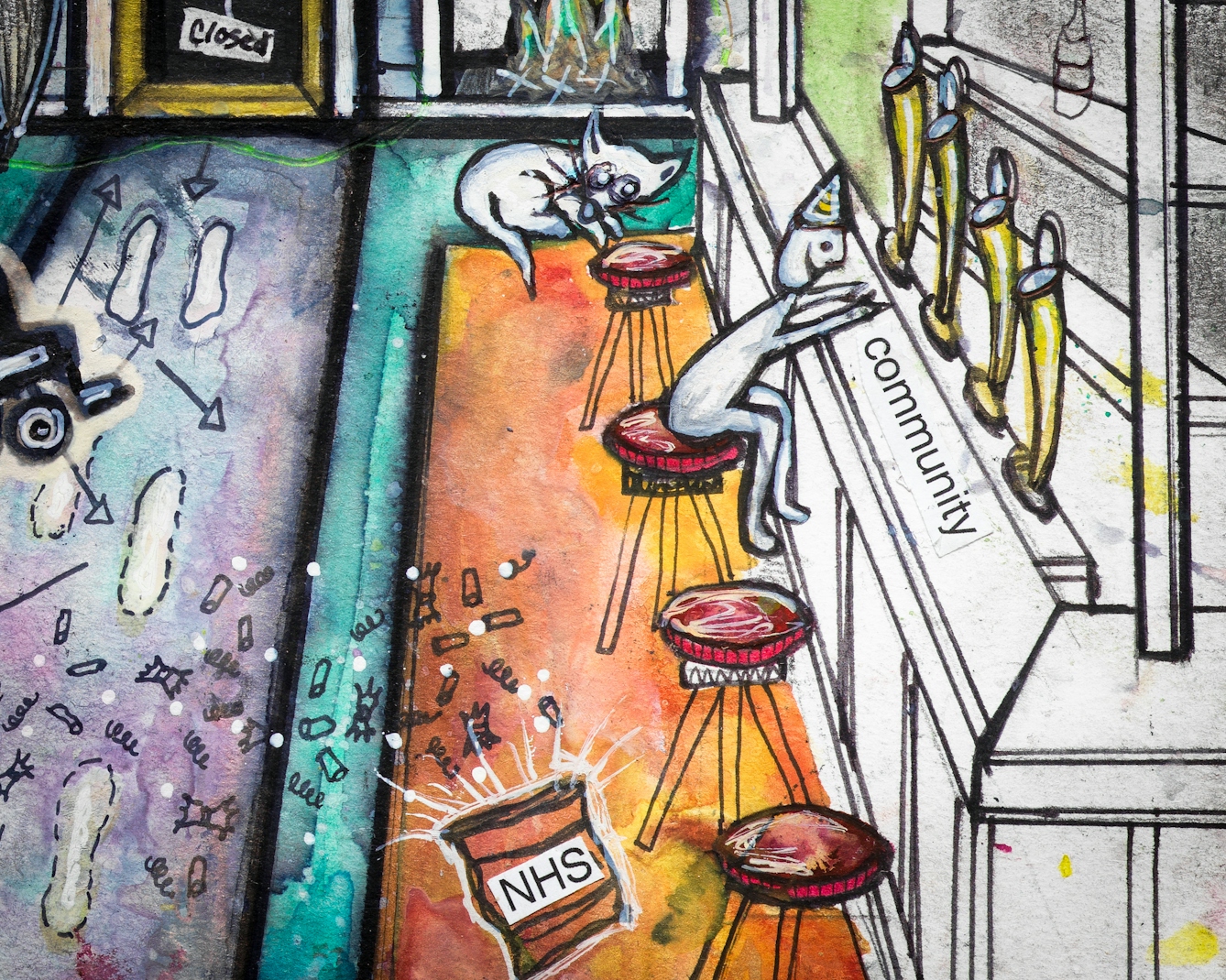
“In January I sat in the pub below the Finborough Theatre in London and watched as images from Wuhan played on TV. I was having a pizza in between shows.”
Then, Wednesday night, I would come home and lock my door for the foreseeable future. No going out, no meetings, no rehearsals, no possibility of contagion. After months of going non-stop, some rest to avoid whatever this thing was sounded… nice.
Wednesday morning I awoke, still sick, but it was nothing a little Day Nurse couldn’t keep in check. If something was coming, I’d know to stay home. The end of the world is always clear. Right?
The train trip between Oxford and London is made for day-trippers and travelling intellectuals. Pop down to London for a meeting, run up to teach a class. People “in the know” take this train. The small station caters to them. Dropping into the Boots, there wasn’t a single packet of generic cold and flu meds left. No tissues. No Day Nurse. No paracetamol.
The moments that we have to make our choices, the choices that actually matter, stare at us from empty chemist’s shelves. The things we keep muted we hope will just go away. But to ignore something is an active choice we ourselves and our government take every day. Kicking a can further down the road is not putting off a decision. You’re still choosing to kick.
Just an inconvenient bug?
I think of my trip to Oxford often now, especially when I lie in bed exhausted from a virus that is still treated by some in my own family as little more than an inconvenient bug. A positive antibody test nearly two months after my last trip out had confirmed what I was sure was impossible.
Somewhere, presumably in the first week of March, perhaps from multiple sources, I picked up Covid-19 and passed it to my live-in personal assistant, her partner and her two-year-old. Dad and baby are doing fine. Me and my assistant – we seem to have ‘long Covid’, as exhaustion has prevailed for months.
“It is exhausting just to exist,” my PA and I will say to each other even five months after our antibody test. Some days I will wake up to find zero muscle tone in my body, something that should be impossible with a diagnosis of cerebral palsy.
At its worst, I will still wake up in the middle of the night with my eyes glued shut from the mucus discharge. Since putting eye drops into someone with cerebral palsy is about as easy as dosing a cat, there’s little relief I can find other than to wash my face and wait for the discharge to start over.
My PA, in contrast, had no trouble with her eyes. Hers took a more traditional Covid-19 route. A high fever, lethargy, but again, never a cough. There have been days where I’ve been a carer to her, taking her meals, doing the shop run, hunting down paracetamol. And there have been days when I couldn’t leave my bed and she has run the whole house. Fortunately, we’ve never had our bad days at the same time. At least, not yet.
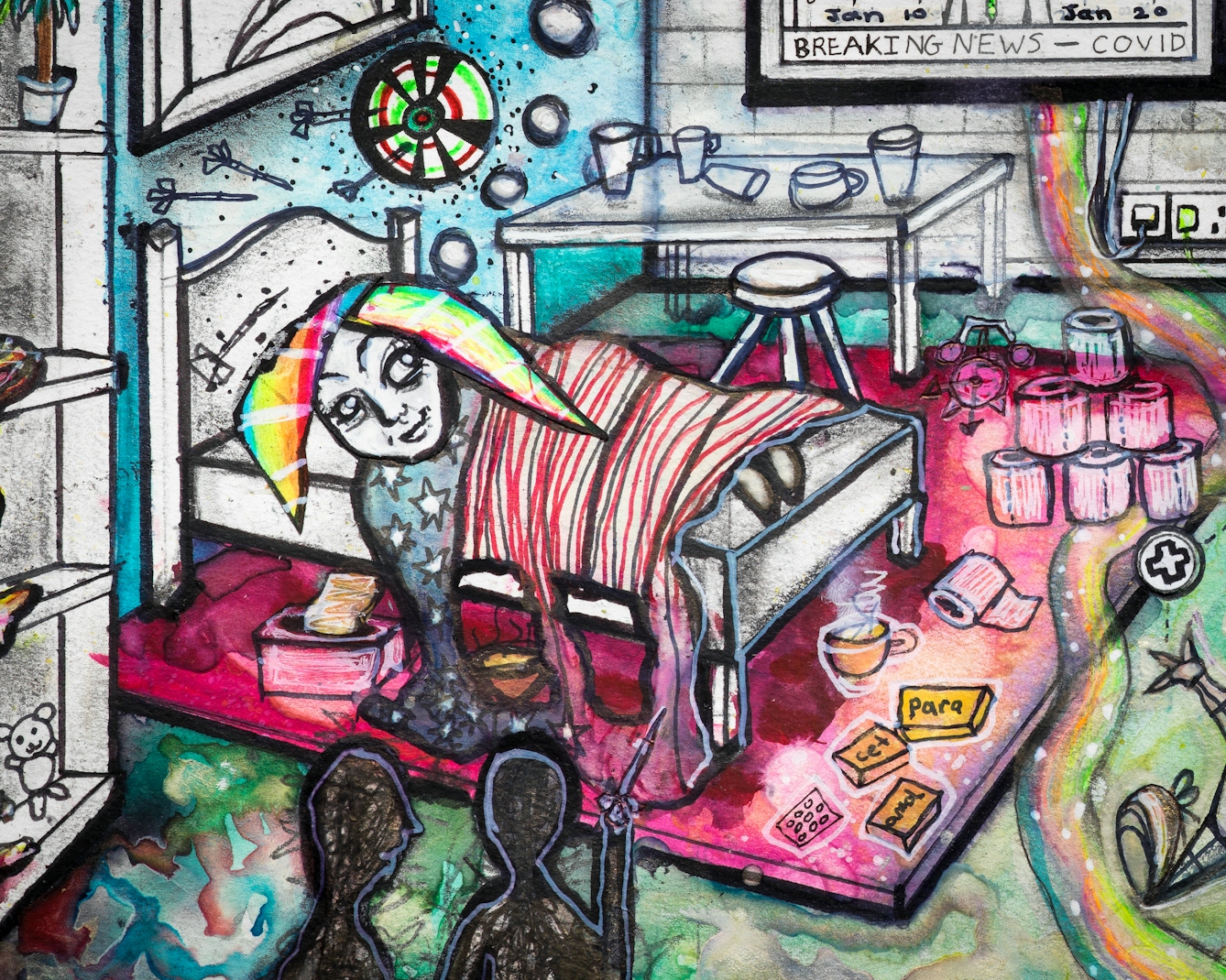
“If a weekend, Friday afternoon until Monday morning, is 60 hours, that weekend I slept for 45 of them.”
How we spread the virus
My best guess as to where I picked this up is that I did exactly the wrong thing that anyone with high-risk status should have been doing at that time. Twice during the first week of March I held a charity bucket as approximately 400 people walked by, dropping in their coins and notes. Beyond the obvious fact that being around 800 people would increase anyone’s risk factor, there is another detail that points to this other possibility. At both functions I sat in my wheelchair, which meant that I was no longer at eye level with the general population and so more susceptible to virus-laden droplets.
My main symptoms of Covid-19 were extreme fatigue and acute conjunctivitis. I never had upper-respiratory symptoms. Rather than inhaling the virus, it seems as though it entered me through my eyes. It was an optician who raised the first warning flag in Wuhan about a potential pandemic. And yet even by mid-March, conjunctivitis was not listed as a symptom.
I can’t help but feel that both society and our elected officials have been complicit in making the disaster far worse than it ever needed to be. We told ourselves that this was an illness that just killed people with pre-existing conditions, so why worry about it?
The government allowed visitors from care homes to come and go and we didn’t count the deaths that followed. It was as if those lives, the lives of the most vulnerable in our society, didn’t matter in the first place. And, thus, our propensity to look away from all things that make us uncomfortable led to our collusion in spreading the virus.
Why lockdown has made my life easier
The situation we are in now is a direct result of a world we all fostered to some extent, where everyone was complicit in ableism, racism, and a myriad of other injustices.
Here’s what really disturbs me: I’m enjoying my time at home. It took me a while to figure out why I felt more relaxed and at ease in the middle of a worldwide crisis that managed to become an infection in my own body. Lockdown has made my life a lot easier. No, I don’t like the fact that me leaving home is an act of political rebellion, but the truth is, it was that way before any of us had ever heard of Covid-19.
Back in January my play was being performed at the Finborough Theatre. It was about the time that I couldn’t leave my flat for almost a year because British Airways smashed up my wheelchair, leaving me with no replacement.
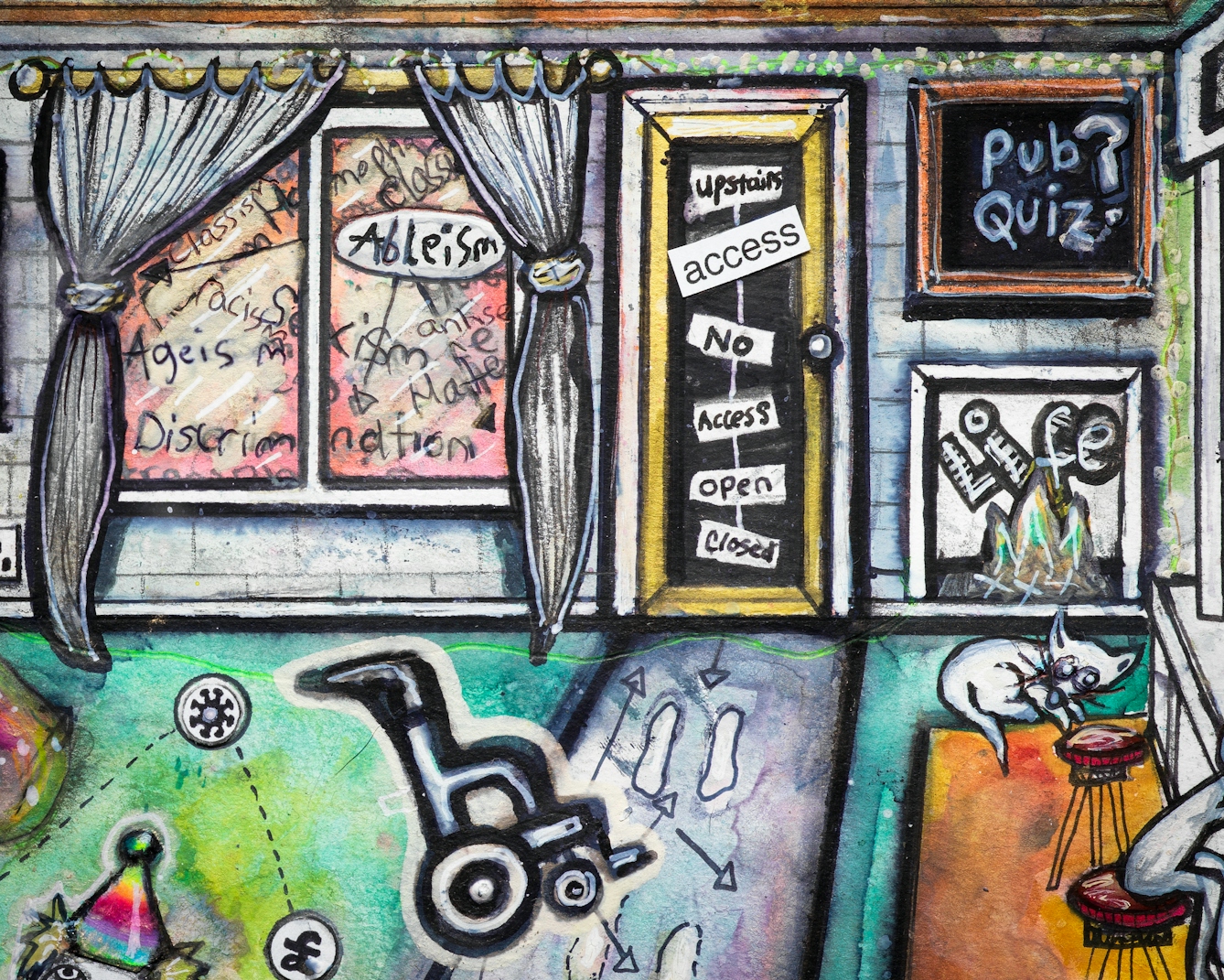
“Not having to face the daily cheese-grater of discrimination, not being made complicit in ableism by moving on and ‘not making a fuss’ ... has given my consciousness a respite and my emotions room to breathe for the first time ever.”
For the past three years, my access to the outside world has been limited, as my building’s management company, Guinness, has neglected to keep our lift in working order, allowing it to malfunction for over fifty days. The first thought I had after I was told that I had been nominated for an Olivier Award last year, for my play ‘Schism’, was: “Too bad this won’t stop me from being kicked off London buses, like what happened yesterday.”
Not having to face the daily cheese-grater of discrimination, not being made complicit in ableism by moving on and “not making a fuss” in the outside world has given my consciousness a respite and my emotions room to breathe for the first time ever.
Our choices make us complicit
Since lockdown began, my mental health has never been better. It was a million self-justified and seemingly innocuous little choices we all made in our day-to-day lives that led us here. As much as I want to point to political parties and rich fat cats, I have been too careless in my own life to lay the blame out there. In truth, there are floods of excuses that serve as justification in my mind with regards to going on the train when I knew I was sick with something:
The high-risk list wasn’t out yet.
My symptoms didn’t match.
I didn’t see any vulnerable people.
The meeting had already been rescheduled four times.
Sometimes, watching Dominic Cummings or Matt Hancock on TV, I am sure I see flashes of the same self-protective instinct shoot through them. It’s hard not to notice when we have the same reflex. We tell ourselves that if we were acting badly, we would know it. But since our conscience is clear, there is little to worry about. We point to the deaths in care homes and say, “They were going to die anyway.”
And then we complain that a mask fogs up our glasses.
We hoard pasta and toilet paper from all of the other hoarders.
We shake our finger and say that Johnson is play-acting at leadership.
But I know for myself, even as someone who is deemed ‘vulnerable’, someone who calls herself a care-filled person, too often I am play-acting at being moral.
I knew I was sick. I took the train anyway.
We are as morally responsible for the effects of what happens when we don’t change course as we are for the effects of when we do. Both options are making a choice; both versions are “taking action”. And when the time for a reckoning comes, too often it is a thousand choices and decisions that are complicit in what later reads like an inevitable disaster.
About the contributors
Athena Stevens
Athena Stevens is a writer, performer director and social activist. She is the Artistic Director of Aegis Productions Ltd, Writer-in-Residence at the Finborough Theatre and Creative Council member and Associate Artist at Shakespeare’s Globe Theatre. In 2019 she was nominated for an Olivier Award for Outstanding Achievement in an Affiliate Theatre for her play ‘Schism’. Born in Chicago, she now lives in London. Athena was born with athetoid cerebral palsy.
Carrie Ravenscroft
Carrie is a queer and neurodivergent artist from London. Her art practice focuses on women’s health, late diagnosis and the mind-body connection, which she communicates through colour, characters, and symbolism in detailed, linked artworks. Recent creative projects include a neuroart exhibition in collaboration with neuroscientists at the Kings College ADHD Research Lab. Outside of making art, Carrie is a a mental health support worker and art psychotherapist at Mind, the mental health charity, and volunteers as a psychedelic first aider with the charity PsyCare.
